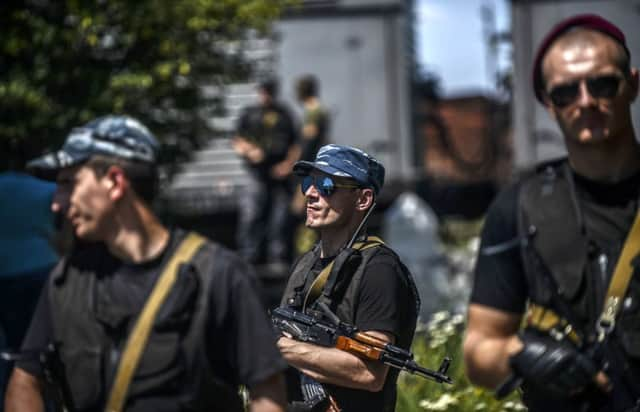Leaders: Tough talking, but tough decisions too


They are intended to imply that the prime minister is resolute, determined to lay down hard lines that Mr Putin must follow, or else.
Or else what, precisely? Today, a meeting of EU foreign ministers should reveal the answer. There is a long list of demands to be met. First, that those investigating the crash should have unimpeded access to the crash site and the victims. Second, that the separatist militias who have been moving wreckage and trying to conceal it should stop and return everything which has been removed, Third, that the bodies should be repatriated as soon as possible.
Advertisement
Hide AdAdvertisement
Hide AdBut these are only basic decencies that any civilised country should undertake when a tragedy of this scale has happened. The list of demands goes on.
Fourth, Mr Putin must cease arming the separatists and remove some of the more sophisticated weaponry they may still possess, such as the Buk missiles, from them. Fifth, he should cut them off from the intelligence services and military advice Russian forces have been supplying.
This, Mr Putin is unlikely to heed, unless there is some sign that the Ukrainian government reins in its present attacks on separatist insurgents.
So what does “or else” mean? According to Mr Cameron’s spokesman, it means moving beyond freezing Russian assets in EU capitals and bans on foreign travel by Mr Putin’s inner circle. Financial services, defence, and energy are some of the areas that could come under sanction.
Financial sanctions work in two ways. They restrict Russian companies’ access to working and investment capital, which impedes not just their growth but their continuing activity, so hurting the Russian economy. They also make overseas investors much less likely to continue investing in Russia, which has the same effect. Defence sanctions, essentially the sale of Russian military equipment to EU members, has the same consequence with the additional value that it is a more obvious sign of Russia becoming increasingly isolated. Sanctions on energy can range from regulatory action, such as Germany’s recent withholding from Gazprom of permission to use a pipeline, to an effective blockade on the sales to the EU of oil and gas.
But this latter action highlights that these sanctions are a two-edged sword. They will injure Russia’s economy, but they will also wound Europe, parts of which, for example, could not get through a winter without severe difficulties if homes and offices were not heated by Russian gas.
How far EU leaders, some of whose economies are distinctly shaky, are prepared to go with this agenda is now about to be tested. It could turn out to be as much Mr Cameron’s and his EU colleagues’ defining moment as it is Mr Putin’s.
Games on as we rally to the flags
Now it is the eve of the Games and the excitement has built up beautifully. Yesterday it really did seem like Glasgow and Scotland had been gripped by Games fever. Glasgow airport had one of its biggest days, when about 1,000 of the 4,500 athletes due to compete arrived.
Advertisement
Hide AdAdvertisement
Hide AdArrivals brought the Games village to exhilarating life, the Queen’s baton tour thrilled thousands in the city centre, and the streets rippled with the rainbow of the Games colours and logo.
Amidst this national welcome for the great international mix of sport, culture, and peoples of the Commonwealth, came the first opportunity for Scottish patriotism to stir – judo player Euan Burton was chosen by his 310 Scottish teammates to be Scotland’s flag-bearer at tomorrow’s opening ceremony.
He is a great choice. He has competed in two Olympics and is a European Open gold medal-winner, but this will be his first Commonwealth Games. That’s not his fault – judo has not been a Commonwealth event since 2002 in Manchester, where Mr Barton was a reserve and training partner for Graeme Randall, who won gold for Scotland. Hopefully, his hardest task over the next fortnight will be to keep the crowd’s attention on the Saltire when Scotland parade into the arena wearing those, ahem, “striking” turquoise and fuchsia outfits.
Good luck to him! It is a richly-deserved honour for a dedicated sportsman who now counts, at the age of 33, as a bit of a veteran. Not only has he sacrificed much in the pursuit of excellence, but he is dedicated to coaching the next generation of judo players. He deserves this moment in the spotlight and, we hope, again soon on a winner’s rostrum.